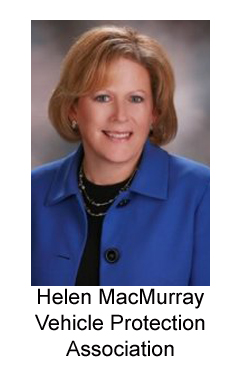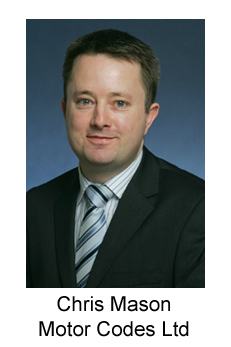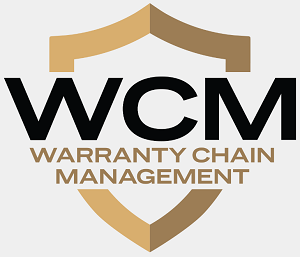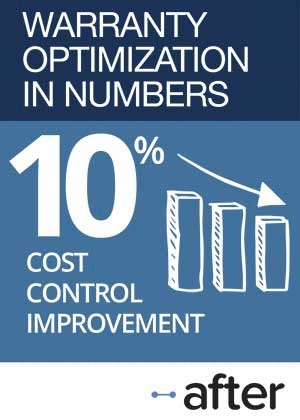January 14, 2010 |

|
ISSN 1550-9214 |
Vehicle Protection Association:Although it would have been better to prevent the "expiring warranty" scam from trashing the reputation of the vehicle service contract industry, efforts are now under way to repair the damage by making direct marketers adhere to a code of conduct. In the UK, however, the code preceded the need, so there was no problem, at least in the vehicle service contract industry.Soon, it will be safe for all of us to once again tell the people we meet at parties and weddings what we do for a living. "I work in the warranty business," we will say, and what they will not say in response is "Oh yeah, one of your buddies called my cell phone yesterday and told me that my car's warranty was expiring." That's because the scourge of "expiring warranty" scams is showing signs of winding down, thanks not only to the de jure solutions now being pursued in the courts by 50 angry attorneys general and the reawakened Federal Trade Commission, but also the de facto solutions the market itself is imposing on those who dared to abuse their customers. One the one hand, thanks to the increased enforcement of "do-not-call" rules, the companies that called every phone number they could find are now curtailing those activities, letting some of their less occupied sales staff go, and finding other ways to sell their vehicle service contracts. On the other hand, the industry itself is making great progress in the realm of industry self-regulation, thanks to the efforts of trade groups such as the Vehicle Protection Association. Industry Self-Regulation Helen MacMurray, a partner in the law firm of MacMurray, Petersen & Shuster LLP and the legal counsel of the Vehicle Protection Association, said the trade group's members are now beginning to implement the Standards of Conduct that she finished editing last October. Once they do, her law firm will begin conducting audits, and the VPA's board will begin certifying those members as compliant. Back in an August 14, 2008 Warranty Week article, MacMurray said that the direct marketers of vehicle service contracts -- those who sent out postcards and emails, advertised on television and radio, or called consumers directly -- would have to self-regulate or they'd be run out of business by the consumer protection agencies and attorneys general that were logging an incredible number of complaints from their constituents even then. So here we are in early 2010, and some listened but most did not. And the consumer protection agencies and attorneys general did exactly what MacMurray predicted they would do. "It's run a lot of people out of business," she said of the groundswell of negative publicity and the prosecutions it caused. Seventeen months ago, there were perhaps 100 to 120 direct marketing companies in the business, many of them auto-dialing or mass-mailing their "expiring warranty" messages at will, until the regulators simply had enough. Many were litigated out of business, or had to shutter when the do-not-call and telemarketing rules became much more restrictive. Survival of the FittestToday there are perhaps only 40 companies left in the direct marketing industry, though that thinning of the herd may have a hidden benefit. Simply put, the worst fell first, and fell hardest. Those who called the Senator's mobile phone or rang the 911 operators were the first to be served with the court injunctions. The remaining survivors, having seen what happens to the bad guys, are now much more likely to do the right thing. Meanwhile, MacMurray hasn't given up on industry self-regulation. In fact, she said she thinks the chances of the remaining industry players putting in place an effective plan for self-regulation have actually increased. "Since we last talked, we are now at a level of buy-in of who's left in the industry to truly make it succeed, and to succeed by wholly complying with the law in a manner where you are constantly checked, and probed, and mystery shopped," MacMurray said. Evolution has done its job: the fittest have survived. That's not to say that there aren't still guys operating illegal auto-dialing operations out of their spare bedrooms in Miami and Las Vegas, concealing both their identities and locations, and evading both the regulators and the process servers. But their activities have dropped off considerably, down perhaps to the level of the "Bill Gates selected your email address to win the Microsoft sweepstakes" or the "I am a dead Nigerian millionaire with no family" scams. Because of all the uproar over the auto-dialers and their "expiring warranty" scam, however, the VPA's Standards of Conduct have now effectively banned the use of pre-recorded marketing messages by its members. Calls by live persons are still permitted by the VPA's rules, but federal telemarketing sales rules have meanwhile become much stricter. So that sales channel has lost its luster. Besides, the primary appeal of the auto-dialers was their low operating cost, and that advantage disappears as soon as live attendants become involved. Not Extended Warranties?Version 2.0 of the Standards of Conduct document was published in October 2009. And it bans not only pre-recorded solicitations, but also Caller ID spoofing (concealing the true source of the calls), false linkages of the sales pitch to the vehicle manufacturer or dealer, and even the use of the terms "warranty" or "extended warranty" to describe the service contracts for sale. To be specific, the standards state that "Members shall not use in their company name, advertisements, sales solicitations or any other description of their products, words such as "warranty," "dealer," "dealership," "manufacturer" (including actual manufacturer's name; e.g. "Ford") or any other words that falsely imply that the company is somehow associated with the manufacturer of the motor vehicle." MacMurray said that was done to prevent consumers from confusing the vehicle manufacturer's warranty with the services being offered by these unrelated third parties. "The majority of what's sold by our members are service contracts," she said. Granted, the term "extended warranty" may also have been an accurate description of the services being offered, but it was being combined with company names and department names in such a way as to become deceptive. So the VPA's members decided to ban the use of the word "warranty" in either the company name or the product name. Members also agreed to ban the use of words such as "insurance," "surety," or "mutual" in their marketing materials, and also cannot choose company names that are deceptively similar to the names of any existing insurance companies. The goal is to avoid making any statements that could be misleading or confusing, and to avoid implying any nonexistent affiliation with a manufacturer, dealer, or auto insurance company. Elsewhere, the standards ban the use of marketing terms such as "exclusive," "limited time," or "preselected," unless the offers really are time-limited or are made to only a selected few. The rules also ban implying that the service contracts on offer are in any way linked to product recalls. If a vehicle identification number is included, only the first 12 digits can be mentioned. If a VPA member should choose to use any service providers located outside the United States, those service providers must adhere to the VPA's standards as well as all applicable U.S. laws. And before they accept a call transferred from any outside service provider, they "must conduct due diligence to ensure that the transfers were obtained legally." In a very comprehensive manner, the document forbids most of the practices that got the industry into trouble, and closes most of the loopholes that could have been used to allow those practices to continue. Going Into Training ModeBesides the rules outlined in the Standards of Conduct, there is also now an annual audit process in place, under which an attorney from the MacMurray, Petersen & Shuster law firm will visit the business and conduct an on-site inspection. In these early days, MacMurray said, most of those audits quickly turn into compliance tutorials, as the attorney finds violations and instructs the member company how to correct them. "The auditor helps them set up policies and procedures, and helps them review their calls -- everything they need to be able to comply with the standards," MacMurray said. "While the auditor is there, she listens to calls, and she listens to tapes of calls. (We now require all calls be taped.) And once they've met all the standards to her satisfaction, she recommends to the [VPA] board that they be certified." The list of VPA board members now includes: Rebecca Howard of PayLink Payment Plans LLC (formerly Warranty Finance LLC); Scott McMillan of Mepco Finance Corp.; Carter Patterson of Forté Data Systems Inc.; Marci Johnson of Summit Finance LLC; Matthew Weil of American Guardian Warranty Services Inc.; Paul Sporn of Royal Administration Services Inc.; and Paul Chernawsky of Endurance Warranty Services. Mystery ShoppersBut just to be sure each member actually deserves to be certified, MacMurray then has her staff actually call or email the company in question, posing as prospective customers, just to see if they really are following all the VPA's rules. Ironically, in the middle of our interview, one of those companies seeking certification called her back -- not knowing who she was -- asking her if she was shopping for a service contract. By the way, her law firm is located in New Albany, Ohio, so anyone handling a customer in the (614) area code had better be on their best behavior. MacMurray said she told the salesman to go ahead with the purchase and to process a deposit for her, but she told us that she would later call him back and cancel it. That, by the way, will validate that all the VPA's rules for cancellations and refunds are being followed, as outlined on page 15 of the Standards of Conduct. Buyers have 30 days to cancel, and the seller has 30 days to make the refund (but only five days to return the deposit if it was made by credit card). If the seller doesn't meet those standards, their certification could be revoked. And if they lose their certification, they may also lose their ability to finance the service contracts they're selling. MacMurray said the three market-leading finance companies that each have an officer on the VPA board -- PayLink Payment Plans LLC (formerly Warranty Finance LLC), Mepco Finance Corp., and Summit Finance Inc. -- have each decided not to do business with those who lack or lose certification by the middle of 2010. "With the perilous situation with the regulators," MacMurray said, "only if we can be assured that the members are doing what we say they're doing will everybody be able to escape this constant litigation that they've been under for the last couple of years." MacMurray said the wider goal is to help the regulators sort out which companies are doing the right thing and which need their continuing attention. In fact, she said, once most of the VPA members have been certified, they may begin to help the attorneys general and the Federal Trade Commission hunt down those companies that chose to remain outside the law. Only then can the reputation of the industry be repaired and restored. According to the preamble of the Standards of Conduct, dishonest, misleading or offensive communications will discredit all members of this industry. Because of this guilt by association factor, all companies with a stake in the industry should encourage others to follow these standards as well. Reducing Complaints & LawsuitsHaving been a prosecutor for six years before going into private practice, MacMurray said she is well-aware that they will never get rid of all the bad actors. However, she said she hopes it can be sharply curtailed. "My goal is this time next year, the level of complaints going to the AGs' offices will be dramatically reduced," she said. After reading all 20 pages of the VPA's Standards of Conduct, what becomes painfully obvious is that had these rules been in effect in 2007 there would have been no "expiring warranty" problem. There would have been no "robo-calls." And there would have been no Vehicle Protection Association. But we can't put the genie back in the bottle, and we can't pretend that it never happened just because it happens no more. It's also instructive to note that it didn't happen everywhere. Some of the "robo-calls" spilled over the U.S. border into Canada, probably because they're part of the same telephone numbering system, but they didn't spread to Mexico, Europe, or other geographies. Last year in the United Kingdom, however, some enterprising hustlers did adopt some of the most deceptive and abusive telesales tactics for their sales of satellite television service contracts. Fly-by-night companies across England were calling people at random, claiming to be affiliated with Sky Broadcasting, and telling consumers that their satellite receiver warranties were about to expire. But if you give us your credit card number, we can renew it over the phone. It sounds like they copied their scripts from the "expiring warranty" scammers that plagued the U.S. vehicle service contract business in 2008 and 2009. But they were quickly shut down by local trading standards departments, whose job it is to monitor business activity in their geographic area. Meanwhile, there hasn't been any spread of the contagion into the UK vehicle service contract industry. Why not? UK Industry Code of Practice We asked Chris Mason, the director of Motor Codes Ltd., how the UK had managed to inoculate itself against the malady. He suggested that it was simply a matter of having an industry code of practice in place long before the swindlers thought of attempting to use the "expiring warranty" scam on car owners. "We tend to contain the market reasonably well through primary legislation, and then self-regulation," he said. The UK's Financial Services Authority handles the insurance, reserves, and ratios end of the business, while industry groups such as Motor Codes Ltd. handle the standards of conduct regarding advertising, sales, and claims handling. In fact, Mason said the group has had a code of practice in place since 1990 for mechanical breakdown insurance. Last summer, following the FSA's review of the regulated part of the sector, Motor Codes Ltd. conducted its own review and refresh of the relevant code of practice. That update was published in July 2009, as the "Motor Industry Code of Practice for Vehicle Warranty Products." One big difference from the VPA's code of conduct, Mason said, is that the UK code is aimed at vehicle service contract administrators, while the VPA's code is aimed at the non-dealership sellers. Then again, there's not as much telemarketing of vehicle service contracts in the UK as there is in the U.S., especially by companies that are not owned or operated by the vehicle manufacturer, dealership, underwriter, or contract administrator. So the UK code doesn't really have much to say about how the contracts are sold, and it assumes that the administrators or their dealer-clients are doing most of the selling. Mason said the code of practice is aimed primarily at the administrators, so it doesn't much matter whether the policy was sold direct to the consumer over the Internet, by phone, or in person at an auto dealership. "I don't have to overtly monitor the telesales operations," he said, "because if we see a trend developing through consumer complaints into our advisory and dispute resolution service, that tips us off that someone's acting irresponsibly. And then we address that directly at the top of the tree, with the administrator of the product." Widespread SupportMason said he reckons that the administrators of roughly 65% to 70% of the vehicle service contracts sold in the UK now subscribe to the code. Just last month, an administrator named AutoProtect announced its intent to support the code. Mason said discussions are under way with many of the remaining administrators. Meanwhile, the publicity works both ways. Should any of those subscribers run afoul of the code, they could be suspended or expelled, he said. "And if we suspend or expel someone from the code, we make that very well-known within the UK," Mason added. "So it's an indirect financial penalty on their business, because the coverage that would receive would put a lot of people off buying their product." Fortunately, he said, the majority of administrators are happy to sign up for the code, and adhere to it. "They see it as a positive marketing tool, really." Mason said some of the key players in the industry worked on the development and revision of the code, so it was something they knew they could support in advance. "We launched something that's got the buy-in of all the key stakeholders." Motor Codes also operates a consumer advice line, and also provides access to low-cost and independent arbitration services. The aim is to convince potential buyers of service contracts that those who subscribe to the code and display the Motor Codes logo are deserving of their trust. "We've made the case in point to the administrators that them acting responsibly is a good marketing tool for their operation," Mason said. Don't use high-pressure sales tactics. Don't mislead or misrepresent. Don't deny claims unfairly. And don't deny refunds to those who deserve them. "Don't risk a ripoff. Look for the logo," one of the group's information pamphlets suggests to consumers. The same goes for repair shops. Subscribers to the Motor Industry Code of Practice for Service and Repair will display the logo as evidence of its promise to deliver honest and fair services at open and transparent prices. There's also a Motor Industry Code of Practice for New Cars that outlines how warranties should be written, and how claims should be handled. Living Outside the LawThe service and repair code is supported by some 5,000 UK repair shops. The new car code is supported by dealers who sell roughly 99% of the UK's new passenger cars. So there are very few entities outside of the system. Still, there are entities outside the system. "I think there will always be instances where people will try to exploit consumers," he said. "But I think that in the UK, industry-led self-regulation working alongside and in conjunction with primary legislation is something that we're used to. That's the way things work here." And it's the way things could also work in the United States, if industry is willing to adhere to its code of conduct. More importantly, Mason said, what's needed is some effort by industry to police itself. And that means the good guys not only have to do the right thing, but they also have to help to identify and isolate the bad guys who do the wrong thing. "Those who are providing the correct insurance or warranty packages for consumers need to start to separate themselves from the rogue operators who are looking to make good over the short term," Mason said. "And we find that becomes a very powerful tool that starts to promote itself. That's the beauty of self-regulation: If you're one of the good guys, we can help promote to your potential market base the reasons for that, and create a separation between you and those that can't or won't sign up to this code." | |||||||||||||||||||||||||||||||||||||||||||||||||||||||||||||||||||||||||||||||||||||||||||||||||||||||||||||||||||||||||
| |||||||||||||||||||||||||||||||||||||||||||||||||||||||||||||||||||||||||||||||||||||||||||||||||||||||||||||||||||||||||









